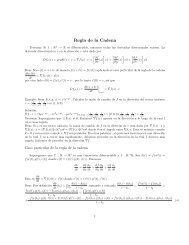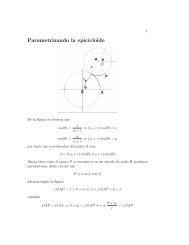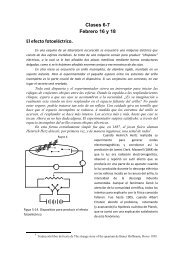"Surely You're Joking, Mr. Feynman!" - unam.
"Surely You're Joking, Mr. Feynman!" - unam.
"Surely You're Joking, Mr. Feynman!" - unam.
You also want an ePaper? Increase the reach of your titles
YUMPU automatically turns print PDFs into web optimized ePapers that Google loves.
who knew that printer knew I was trying to get jobs fixing radios, so he sent a fellow<br />
around to the print shop to pick me up. The guy is obviously poor his car is a complete<br />
wreck and we go to his house which is in a cheap part of town. On the way, I say,<br />
"What's the trouble with the radio?"<br />
He says, "When I turn it on it makes a noise, and after a while the noise stops and<br />
everything's all right, but I don't like the noise at the beginning."<br />
I think to myself: "What the hell! If he hasn't got any money, you'd think he could<br />
stand a little noise for a while."<br />
And all the time, on the way to his house, he's saying things like, "Do you know<br />
anything about radios? How do you know about radios you're just a little boy!"<br />
He's putting me down the whole way, and I'm thinking, "So what's the matter with<br />
him? So it makes a little noise."<br />
But when we got there I went over to the radio and turned it on. Little noise? My<br />
God! No wonder the poor guy couldn't stand it. The thing began to roar and wobble <br />
WUH BUH BUH BUH BUH A tremendous amount of noise. Then it quieted down<br />
and played correctly. So I started to think: "How can that happen?"<br />
I start walking back and forth, thinking, and I realize that one way it can happen is<br />
that the tubes are heating up in the wrong order that is, the amplifier's all hot, the tubes<br />
are ready to go, and there's nothing feeding in, or there's some back circuit feeding in, or<br />
something wrong in the beginning part the RF part and therefore it's making a lot of<br />
noise, picking up something. And when the RF circuit's finally going, and the grid<br />
voltages are adjusted, everything's all right.<br />
So the guy says, "What are you doing? You come to fix the radio, but you're only<br />
walking back and forth!"<br />
I say, "I'm thinking!" Then I said to myself, "All right, take the tubes out, and<br />
reverse the order completely in the set." (Many radio sets in those days used the same<br />
tubes in different places 212's, I think they were, or 212A's.) So I changed the tubes<br />
around, stepped to the front of the radio, turned the thing on, and it's as quiet as a lamb: it<br />
waits until it heats up, and then plays perfectly no noise.<br />
When a person has been negative to you, and then you do something like that,<br />
they're usually a hundred percent the other way, kind of to compensate. He got me other<br />
jobs, and kept telling everybody what a tremendous genius I was, saying, "He fixes radios<br />
by thinking!" The whole idea of thinking, to fix a radio a little boy stops and thinks,<br />
and figures out how to do it he never thought that was possible.<br />
Radio circuits were much easier to understand in those days because everything<br />
was out in the open. After you took the set apart (it was a big problem to find the right<br />
screws), you could see this was a resistor, that's a condenser, here's a this, there's a that;<br />
they were all labeled. And if wax had been dripping from the condenser, it was too hot<br />
and you could tell that the condenser was burned out. If there was charcoal on one of the<br />
resistors you knew where the trouble was. Or, if you couldn't tell what was the matter by<br />
looking at it, you'd test it with your voltmeter and see whether voltage was coming<br />
through. The sets were simple, the circuits were not complicated. The voltage on the<br />
grids was always about one and a half or two volts and the voltages on the plates were<br />
one hundred or two hundred, DC. So it wasn't hard for me to fix a radio by understanding<br />
what was going on inside, noticing that something wasn't working right, and fixing it.<br />
Sometimes it took quite a while. I remember one particular time when it took the









